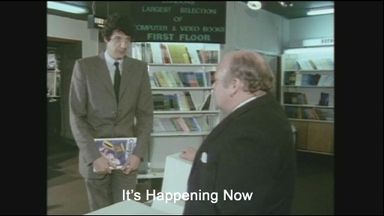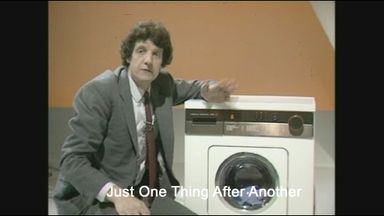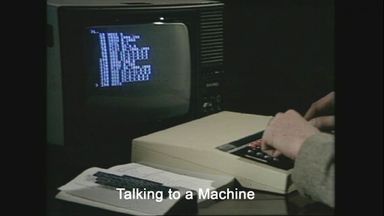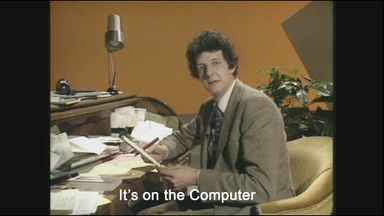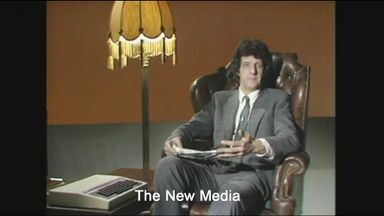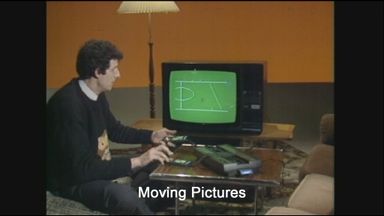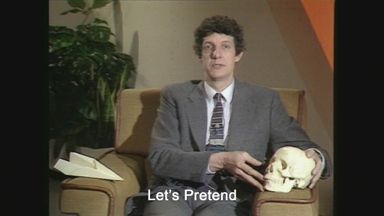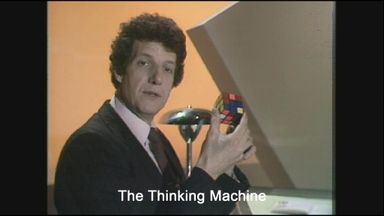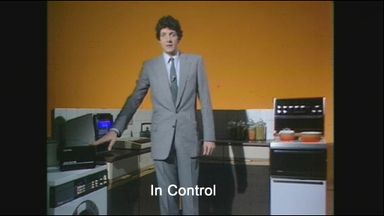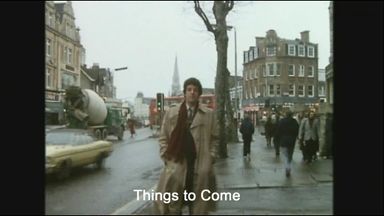The Computer Programme
1. It's Happening Now
Clips from this programme
Roy Kinnear and Chris Serle make fun of the confusion of names of computer brands new to the high street: Apple, Acorn, Tangerine, Pet, and so on. The BBC Microcomputer makes its first, furtive appearance. Chris introduces the series - for those - like him - new to computing
Duration: 01:36In the opening titles the BBC Computer Literacy Project owl appears, symbolically flying into the home. The owl is the symbol of the ancient greek goddess of wisdom and knowledge
Duration: 00:27Ian McNaught Davis makes his first appearance standing between the stones of Stonehenge. He speculates it was possibly a kind of ancient computer designed to predict the seasons. Like early 20th century computers it was inflexible and limited.
Duration: 02:31At the European Weather Centre 50 million instructions per second are carried out by a Cray supercomputer, using data from around the world to predict the 10 day forecast. It is about a million times more powerful than the newly arrived personal computer.
Duration: 01:47Serle reveals there are over 100 makes of personal computer on sale in the UK, many being heavily promoted in the glossy popular and specialist magazines and aimed now at families. They even feature in TV commercials
Duration: 00:54Serle says this series is for beginners, like him. Ian Mc Naught Davis is introduced as the 'expert'. Mac, a computer professional, started his career with valve-based machines and now runs a company providing financial software for companies. He describes the amazing and accelerating rate of change in the electronics industry using the analogy of a cheap, disposable car.
Duration: 01:13The revolution has come about because of the silicon chip. Silicon is a component of sand and will never run out. Mac predicts massive increases in speed as chips develop. A montage of images shows computer-dependant applications
Duration: 01:09The advantages of computers: they're good at repetitive thing, never get tired, don't make mistakes and Computers may be used for games but we can program them ourselves and that is fun useful and creative.
Duration: 01:18What Chris, as a journalist, needs to get going - a computer, a screen, a keyboard and a tape recorder or disc to store programmes and a printer
Duration: 00:34A small sweet shop owner - Phyllis Arandale - tells the story of how a PET microcomputer has dramatically improved her business
Duration: 03:28Magazines provide computer programmes you can type in or you can get a program on a cassette tape. In its first real appearance in the series, the BBC Micro is used to load a bat and ball games program. The program is loaded from a tape recorder. We see the first 'commands' and the listing of a program.
Duration: 03:14More serious applications include accessing databases such as Prestel to make an airline booking. At the airport we see that computers are essential for cheap, efficient, flexible travel
Duration: 03:05Rex Malik, computer journalist and social commentator predicts the rate of change. The Cray will soon be superseded. Soon, everyone will have a powerful computer.
Duration: 02:19The Computer Programme
1. It's Happening Now
First broadcast: 11th January 1982
Duration 24:51
"Don't expect the computer revolution to happen tomorrow, it's going on all around us." Chris Serle, Ian McNaught-Davis and Gill Nevill begin their exploration of the world of Information Science and ask: 'What can computers do for us? Who is using them now, and where is this technology likely to lead?' Director: FRANK ASH Director: MATT BONEY Producer: PAUL KRIWACZEK
Now playing
2. Just One Thing After Another
First broadcast: 18th January 1982
Duration 24:53
CHRIS SERLE, IAN MCNAUGHT-DAVIS and Gill Nevill, continue their exploration of the world of information science. Even the most elaborate and sophisticated computer programs are made up of only a few types of relatively simple steps. The art of computer programming lies in combining these into ever more complex combinations. Directors FRANK ASH, MATT BONEY Producer PAUL KRIWACZEK
3. Talking to a Machine
First broadcast: 25th January 1982
Duration 24:23
CHRIS SERLE, IAN MCNAUGHT-DAVIS and GILL NEVILL continue their exploration of the world of information science. The difficulty of communicating with computers is that they are machines and we are people. The common language we share can turn out to be a lot more like English than we might expect. Directors FRANK ASH, MATT BONEY Producer PAUL KRIWACZEK
4. It's on the Computer
First broadcast: 1st February 1982
Duration 24:39
CHRIS SERLE, IAN MCNAUGHT-DAVIS and GILL NEVILL continue their exploration of the world of information science. Storing information is what the great majority of computers are used for. But how much can they hold, and how can the stored information be easily retrieved? Director MATT BONEY Producer PAUL KRIWACZEK
5. The New Media
First broadcast: 8th February 1982
Duration 24:12
CHRIS SERLE, IAN MCNAUGHT-DAVIS and GILL NEVILL continue their exploration of the world of Information Science. 5: The New Media : The greatest public impact of information technology is likely to be in the provision of new means of communication. Directors FRANK ASH, MATT BONET Producer PAUL KRIWACZEK
6. Moving Pictures
First broadcast: 15th February 1982
Duration 24:37
CHRIS SERLE, IAN MCNAUGHT-DAVIS and GILL NEVILL continue their exploration of the world of information science. For many people games, with their elaborate visual displays, are the most commonly encountered aspect of computer technology. But generating sound and pictures from a computer is no different to manipulating text. Director: MATT BONEY Director: Frank Ash Producer: PAUL KRIWACZEK
7. Let's Pretend
First broadcast: 22nd February 1982
Duration 24:32
CHRIS SERLE, IAN MCNAUGHT-DAVIS and GILL NEVILL continue their exploration of the world of information science. 7: Let's Pretend: Training space-shuttle pilots, or testing bridges to destruction, is normally too costly or too dangerous to do on the real thing. But by giving a computer an exact description of how a complicated system behaves, it can mimic anything from the British economy to the world's weather. Directors FRANK ASH, MATT BONEY Producer PAUL KRIWACZEK
8. The Thinking Machine
First broadcast: 1st March 1982
Duration 24:30
CHRIS SERLE, IAN MCNAUGHT-DAVIS and GILL NEVILL continue their exploration of the world of information science 8: The Thinking Machine: In spite of years of investment in the development of intelligent machines, computer scientists are still a long way from equalling human thought, let alone surpassing it. The future, however, may yet present us with great surprises. Directors MATT BONEY, FRANK ASH Producer PAUL KRIWACZEK
9. In Control
First broadcast: 8th March 1982
Duration 24:34
CHRIS SERLE, IAN MCNAUGHT-DAVIS, GILL NEVILL 9: In Control: By far the greatest number of computers with which we will come into contact in the future will be invisible. They will be the microprocessors built into many of our domestic appliances, replacing many of the mechanical systems that we use today, with greatly improved reliability, flexibility, and at low cost. Directors FRANK ASH, MATT BONEY Producer PAUL KRIWACZEK
10. Things to Come
First broadcast: 15th March 1982
Duration 24:17
CHRIS SERLE, IAN MCNAUGHT-DAVIS and GILL NEVILL continue their exploration of the world of information science. Things to Come: Information technology has the power to change the face of our society completely by taking over the work of a large majority of the population. But will this be allowed to happen, and which aspects of our economic life are most likely to be affected? Directors MATT BONEY, FRANK ASH Producer PAUL KRIWACZEK














